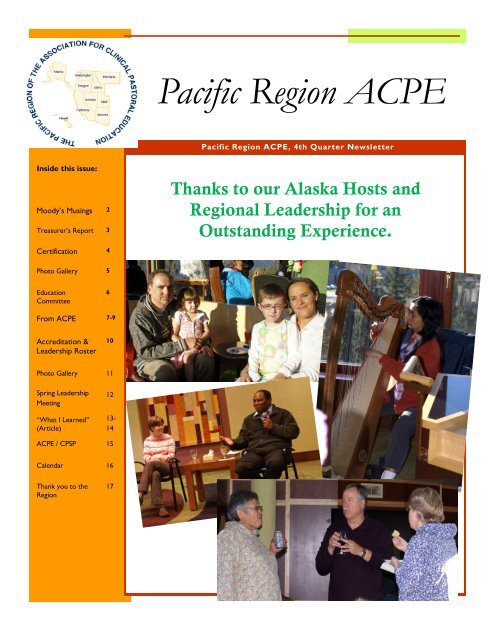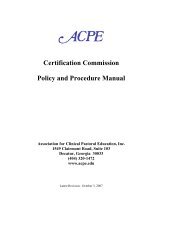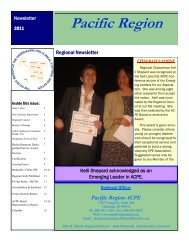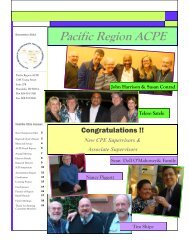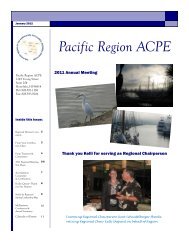Pacific Region ACPE
Pacific Region ACPE
Pacific Region ACPE
Create successful ePaper yourself
Turn your PDF publications into a flip-book with our unique Google optimized e-Paper software.
<strong>Pacific</strong> <strong>Region</strong> <strong>ACPE</strong><br />
<strong>Pacific</strong> <strong>Region</strong> <strong>ACPE</strong>, 4th Quarter Newsletter<br />
Inside this issue:<br />
Moody’s Musings 2<br />
Treasurer’s Report 3<br />
Certification 4<br />
Thanks to our Alaska Hosts and<br />
<strong>Region</strong>al Leadership for an<br />
Outstanding Experience.<br />
Photo Gallery 5<br />
Education<br />
Committee<br />
6<br />
From <strong>ACPE</strong> 7-9<br />
Accreditation &<br />
Leadership Roster<br />
10<br />
Photo Gallery 11<br />
Spring Leadership<br />
Meeting<br />
―What I Learned‖<br />
(Article)<br />
12<br />
13-<br />
14<br />
<strong>ACPE</strong> / CPSP 15<br />
Calendar 16<br />
Thank you to the<br />
<strong>Region</strong><br />
17
<strong>Pacific</strong> <strong>Region</strong> <strong>ACPE</strong>, 4th Quarter Newsletter<br />
Page 2<br />
Fall Report 2010<br />
As this year comes to an end, I am pleased to report the <strong>Region</strong> is alive and well.<br />
Two years ago we had many Centers looking at severe reductions or closure. Several<br />
of our colleagues lost their positions or had their programs reduced. With the<br />
involvement of our Supervisors, the Council and Committees, we have turned the<br />
corner.<br />
Nearly all the proposed reductions were averted. Many of the Supervisors affected<br />
by reductions have found new positions or are building creative programs. The<br />
Committee Chairs and their representatives worked closely with the sites to reframe<br />
their thinking, locate new staff and add training positions. This year we had<br />
all the people appearing before the Certification Committee granted their request.<br />
Six people were named Associate Supervisor or CPE Supervisor. Five Centers that<br />
were ―on hold‖ or closed have reopened and are functioning stronger than ever.<br />
Several other Centers who lost positions had them restored and at least four Centers<br />
have added Supervisory positions and/or residency slots.<br />
Along with this support of Centers and Supervisors, the Phoenix Project took on a<br />
whole new life. We are now planning an expanded webpage, interactive on-line teleconferencing,<br />
shared educational materials, templates for accreditation materials,<br />
and greater resourcing of our Centers and Supervisors. The planning is well underway<br />
for 2011 to be the year we begin implementing this project. While it will take<br />
much effort from all of us, I am confident this will bolster our educational work and<br />
strengthen our offerings to students. There will be opportunities for all of you to<br />
be involved in creating these new support structures. Look for the announcements<br />
from our Leadership.<br />
<strong>Region</strong>al Director<br />
John Moody<br />
Moody’s<br />
Musings<br />
Finally we have to give significant credit for our advancement to the Centers who<br />
support our programs. Without administrative support and Center commitment,<br />
we would not be able to do any of the things we have done. The institutions give<br />
considerable financial, personal, and administrative support that makes what we do<br />
possible. I hope you all take the time to thank the leadership at your institution for<br />
their consist and considerable support of CPE. They deserve it.<br />
Thanks to Kelli Shepard and our Council/Committees for<br />
their leadership. And thank you to all of you who daily offer<br />
care and education in the places you labor. It’s our faithful<br />
commitment to this work that keeps us growing and building<br />
new programs and services for tomorrow. 2011 promises<br />
to be better than 2010. We have come through a difficult<br />
time much stronger than we were and clearer in our<br />
vision. That will hold us in good stead in the next year.<br />
Blessings as we enter a new year.<br />
Aloha, John Moody, <strong>Region</strong>al Director
<strong>Pacific</strong> <strong>Region</strong> <strong>ACPE</strong>, 4th Quarter Newsletter<br />
Page 3<br />
Treasurer’s Report by Carrie Bucker<br />
I am happy to report that our <strong>Region</strong> remains in a very healthy place,<br />
fiscally speaking! I will bring details of our 2010 profit and loss statements<br />
to the <strong>Region</strong>al Council in February. Our revenue and expenses<br />
remain on target, and our <strong>Region</strong>al Director has been effectively<br />
managing our operational budget and working hard to negotiate good<br />
prices on hotels and other expenses related to our regional meetings.<br />
As you know, preparations are underway as we host the <strong>ACPE</strong> Annual<br />
Conference in Salt Lake City in April 2011. Thanks to John Moody,<br />
our <strong>Region</strong>al Director, and our support staff at the regional office for<br />
their hard work and diligence to keep us on track financially! Thanks<br />
to all of you who make sure your fees are paid in a timely manner. As<br />
always, please contact me if you have any questions or concerns at<br />
Bucknec2@sutterhealth.org or 510-204-6731. I look forward to<br />
hearing from you!<br />
Jim Corrigan & David Myler Recognized<br />
These two leaders of <strong>ACPE</strong> were honored by the <strong>Region</strong> for helping<br />
found the GLBT Network thereby creating a place for many in our<br />
Association. Several people stood to share how helpful their<br />
courageous leadership was for them.
Page 4<br />
<strong>Pacific</strong> <strong>Region</strong> <strong>ACPE</strong><br />
Certification Chat<br />
Rod Seeger<br />
Certification Chair<br />
2010 was a hallmark year for our committee. 100% of the requests that<br />
were made by people requesting Candidacy, Extension or CPE Supervisor<br />
were granted. The committee worked hard and so did the people<br />
who presented themselves for certification. Keep up the good<br />
work out there! When you do what I call "your homework" before<br />
coming to the committee your requests usually are granted!<br />
At the national level, four of the six people who requested certification<br />
were certified! We now have three new Associates and one new <strong>ACPE</strong><br />
Supervisor. (Their names are elsewhere in the <strong>Region</strong>al News.)<br />
Our committee is also in flux. John Gillman, who has served for six<br />
years will rotate off having completed two terms. Sat Kartar Khalsa-<br />
Ramey will rotate off after serving three years. Wayne Bell will also<br />
rotate off after completing his term with the committee. We welcome<br />
aboard Bill Hawkins, Amy Furth, Charles Burger and Garrett Starmer.<br />
Changes have occurred with the 2010 Standards for what is required<br />
for BOTH Readiness and Candidacy. It is important that you read<br />
thoroughly through the sections in the 2010 Certification Manual pertaining<br />
to these two areas. If you are supervising an<br />
SES it is also important for you as the CPE Supervisor<br />
to thoroughly read these sections.<br />
Finally, if you want to meet the Certification Committee<br />
in February, your Letter of Intent must be sent in<br />
December!<br />
Got Questions? Email or call!<br />
Payment for certification fees can now be made and mailed to:<br />
<strong>Pacific</strong> <strong>Region</strong> <strong>ACPE</strong><br />
1245 Young Street, Suite 204<br />
Honolulu, HI 96814<br />
If you would like to pay by credit card, please call the <strong>Region</strong>al Office<br />
at 808-591-1388 for more information.<br />
Rod Seeger
<strong>Pacific</strong> <strong>Region</strong> <strong>ACPE</strong>,<br />
Page 5<br />
Alyeska, Alaska
<strong>Pacific</strong> <strong>Region</strong> <strong>ACPE</strong>, 4th Quarter Newsletter<br />
Page 6<br />
Education Committee - Kent Schaufelberger, Chair<br />
Symposium Group Canada Meeting Report<br />
Dagmar Grefe, Author<br />
(Not Pictured — Isn’t she thankful?!)<br />
Have you ever experienced a Canadian heat wave? In July of 2010 <strong>Pacific</strong> <strong>Region</strong> representatives participated together with<br />
Canadian educators in a learning symposium in the beautiful Comox Valley, Vancouver Island. John Moody (<strong>Region</strong>al<br />
Director), Birte Beuck (Certification), Earl Cooper (Accreditation), and Dagmar Grefe (<strong>Region</strong>al Council) joined the<br />
weeklong workshop in order to bring new ideas to the educational work of the <strong>ACPE</strong> <strong>Pacific</strong> <strong>Region</strong>.<br />
Aside from finding out that temperatures of 65° and a windy breeze (sounds hot, eh) make Canadians put on their<br />
tank-tops, shorts and sandals, we became familiar with “Assessment for Learning,” an educational philosophy based on a<br />
continuous partnership and dialogue between teachers and learners. The symposium was facilitated by educational scholars<br />
and administrators and consisted of a nice balance between lectures, work groups, and group presentations.<br />
It wasn’t the outside temperatures but our break-out sessions that made our heads spin. We spent many hours in our<br />
<strong>Pacific</strong> <strong>Region</strong> work group brainstorming, asking questions, and discussing, accompanied often by one of the facilitators who<br />
would offer helpful insights. We tried to translate the material we learned to the context of CPE. We were charged with the<br />
development of ideas and concrete steps that would address findings of the Phoenix group.<br />
The Phoenix group had formed in 2009 in response to some difficulties experienced by centers throughout the <strong>Pacific</strong><br />
<strong>Region</strong>. A survey taken in the region culminated in a report that highlighted among other issues: 1. It takes too long to be<br />
certified as a <strong>ACPE</strong> Supervisor. 2. There are too many CPE supervisory vacancies that may lead to closure of centers. 3. In a<br />
difficult economy it is challenging to communicate the value of spiritual care and CPE as a basically non-reimbursable<br />
service.<br />
The main goal of the Canada work group was it to map out a project that would enhance and develop educational<br />
resources for the <strong>ACPE</strong> centers and members of the <strong>Pacific</strong> <strong>Region</strong>. We came away with a plan that was supported by the<br />
<strong>Region</strong>al Council and well received by regional members during the fall meeting in Alaska:<br />
To develop an electronic resource center that would allow CPE centers, supervisors and members to share their<br />
resources and expertise with each other.<br />
The electronic resource center will make available didactic presentations, theory papers, policies, CPE Handbooks<br />
etc. It will also allow us to use video conferencing to teach at each others’ centers, and engage in supervisory sessions<br />
bridging geographic distances.<br />
Three steps contribute to the development of the electronic resource center and are in process right now:<br />
1. Revamp the website and develop an infrastructure for sharing resources and videoconferencing<br />
2. Develop a curriculum/concrete criteria for the <strong>ACPE</strong> objectives and outcomes for level I, II, and<br />
supervisory CPE.<br />
3. Develop a process of receiving, peer reviewing, and posting resources.<br />
We estimate that in 2011 the website will be increasingly developed and populated with resources. Watch out for<br />
announcements and invitations to share your resources with us. During the <strong>Region</strong>al Meeting in the fall of 2011, educational<br />
faculty from Canada will join us and make their experience and expertise available to us. It’s going to be an engaging meeting.<br />
If 65° makes a Canadian heat wave, we’ll see what our guests will have to say about October weather in San Diego.
<strong>Pacific</strong> <strong>Region</strong> <strong>ACPE</strong>, 4th Quarter Newsletter<br />
Page 7<br />
Report from Board of Directors Meeting<br />
Peter Yuichi Clark & Kelli Shepard<br />
Fall 2010<br />
The <strong>ACPE</strong> Board of Directors met from November 3 through November<br />
6, 2010, in Atlanta. Kelli attended the meeting at the request<br />
of the <strong>Region</strong> because Michele Shields had conflicts in her<br />
schedule. Here is a summary of the Board’s actions during that<br />
meeting:<br />
There was a lengthy discussion between the Board and the Personnel Committee about the implications<br />
of Teresa Snorton’s election as a bishop by the Christian Methodist Episcopal<br />
(CME) Church. The Personnel Committee stated that it has developed a 12 – 18 month<br />
plan with quarterly reviews to evaluate how her CME obligations will affect her <strong>ACPE</strong> work.<br />
The Personnel Committee was clear in saying that Teresa has used and will use her own accrued<br />
PTO time to travel to Africa, and that the <strong>ACPE</strong> policy on designated authority was<br />
activated when she left and will be activated whenever she is away. Teresa herself reported<br />
that the trip to Africa was a profound experience and that her duties as bishop thus far do<br />
not entail much ―on-the-ground‖ time in Africa because of the CME episcopal structure’s<br />
investment in on-site mission supervisors.<br />
The <strong>ACPE</strong> Board and members of the FCPE Board met for a productive day-long joint session,<br />
with three objectives:<br />
Objective 1: To find common ground on a new relationship between <strong>ACPE</strong> and FCPE.<br />
It was clarified that <strong>ACPE</strong> and FCPE are in a parent-subsidiary relationship, and that as<br />
long as the two entities treat assets separately and observe corporate formalities, there<br />
is no ―piercing of the corporate veil‖ and FCPE can continue to function as a legal shield<br />
of <strong>ACPE</strong>’s Endowment. <strong>ACPE</strong> can hire employees to do FCPE’s work as long as there is<br />
a written agreement between FCPE and <strong>ACPE</strong>, and as a 509(a)(1) FCPE can interact with<br />
other foundations in ways that <strong>ACPE</strong> as a non-profit organization does not have access.<br />
The <strong>ACPE</strong> Board committed to a capital campaign in Fall 2009; by this December, the<br />
FCPE’s Executive Director and her administrative assistant will both have left FCPE (and<br />
the FCPE office will move to Decatur); a site for a new building was purchased earlier<br />
this year; and by January 2011, the FCPE Board will have a majority of <strong>ACPE</strong> members.<br />
Objective 2: To clarify shared goals for a capital campaign. The Boards heard a proposal<br />
from the architectural firm of Lord Aeck & Sargent for a new building on the Decatur<br />
site that <strong>ACPE</strong> purchased. It would be LEED gold (i.e., a ―green‖ building) and a short<br />
walk from both a major hotel/conference center and from a MARTA train station in<br />
downtown Decatur, and it would provide much-needed additional workspace and technological<br />
upgrades for the <strong>ACPE</strong> national office. Conceptual drawings for the building<br />
were presented. The project is estimated to require $11M.<br />
Objective 3: To agree upon next steps and priorities. The two Boards then worked<br />
with two consultants from the Georgia Center for Nonprofits, who guided participants through
<strong>Pacific</strong> <strong>Region</strong> <strong>ACPE</strong>, 4th Quarter Newsletter<br />
Page 8<br />
Report from <strong>ACPE</strong> Board of Director’s Meeting continued ...<br />
case statement. The case statement discussion<br />
led to the realization that <strong>ACPE</strong>’s<br />
strategic plan is due for reconsideration<br />
and updating.<br />
As a result of this work, the <strong>ACPE</strong> Board<br />
passed four motions related to the FCPE, develop-mint,<br />
strategic planning, and the capital<br />
campaign:<br />
Development Committee: The <strong>ACPE</strong>’s<br />
development committee will be placed into<br />
the function of the FCPE.<br />
Local Facility Committee: <strong>ACPE</strong>’s president, Sally Schwab, will appoint a committee to<br />
work with <strong>ACPE</strong> national office staff to assess and ensure that the current workspace is safe<br />
and facilitates staff members’ ability to serve the membership.<br />
Strategic Planning: While the FCPE’s Capital Campaign Committee works on a case statement,<br />
the Fund Development work group of the Board was re-purposed to focus on a strategic<br />
planning process (including a review of <strong>ACPE</strong>’s mission, vision, and values), with its results<br />
to be presented to the Board in January and then to be discussed at the town hall<br />
meeting during the Salt Lake City conference.<br />
Capital Campaign: On the principle of ―tithing,‖ the Board approved a motion that $1M be<br />
added to the $11M building capital campaign in order to fund the development and sustenance<br />
of community-based CPE programs.<br />
Because of the decision to relocate the FCPE offices to Decatur and the subsequent departure of<br />
FCPE’s office staff, the <strong>ACPE</strong> Board approved hiring a 0.5 FTE administrative assistant to maintain<br />
FCPE’s database and office management during the staff transition, up to $30K and 6<br />
months. In addition, the Board authorized the Personnel Committee to conduct strategic planning<br />
in regard to staffing for <strong>ACPE</strong> and FCPE and to report its findings at the Salt Lake City<br />
meeting.<br />
The <strong>ACPE</strong> Board worked with the governance proposal study document at great length, with much<br />
attention given to the feedback received from all regions. The feedback from other regions<br />
matched the <strong>Pacific</strong> <strong>Region</strong>’s in many respects, and Board members unanimously agreed that the<br />
proposal needed further study and revision. The Board noted several affirmations and several<br />
areas of little or no consensus:<br />
Affirmations: that the work group had made substantive efforts in bringing forth the proposal;<br />
that there is a need for change in order to increase business efficiency and decrease<br />
costs; that there is a need for diversity; that there must be further dialogue with regional<br />
membership; that there is value in the regional structure; and that any proposal must be explicit<br />
in stating its projected financial implications.<br />
Areas of Low Consensus: that the mission, vision, and values must be considered and integrated<br />
into a revised strategic plan; that the role, function, and budget of the Leader-ship<br />
Council and its relationship with the Board must be made clearer; and that the Board’s
<strong>Pacific</strong> <strong>Region</strong> <strong>ACPE</strong>, 4th Quarter Newsletter<br />
Page 9<br />
Report from <strong>ACPE</strong> Board of Director’s Meeting continued ...<br />
The Board voted to send the following motion to the <strong>ACPE</strong> membership for approval at the Salt<br />
Lake City meeting: That the <strong>ACPE</strong> suspend Article V of its by-laws so that the number of regional<br />
representatives would be reduced from 2 per region to 1 per region, effective with the Fall<br />
2011 meeting, until a new governance structure is in place. In order to cover the costs associated<br />
with convening the current-size Board meeting in Salt Lake City, the Board approved a motion<br />
that Board members would be invited to contribute their travel expenses as a charitable gift;<br />
that the Finance Committee and <strong>Region</strong>al Directors would consult to see if moneys can be designated;<br />
that the national office would seek other funding; and that, as a last resort, a grant be<br />
made from the Endowment.<br />
The Board directed our representatives to the Spiritual Care Collaborative (SCC) to ask the Association<br />
of Professional Chaplains to reconsider its recent decision to withdraw from the SCC.<br />
Three <strong>ACPE</strong> representatives (Teresa Snorton, Sally Schwab, and Tim Thorstenson) will participate in<br />
a formal mediation process with the College of Pastoral Supervision and Psychotherapy on November<br />
30, 2010. Because it is a confidential legal proceeding, few details can be given at this<br />
time. A statement will be issued following the mediation meeting.<br />
The Board authorized $2K in support, along with advising and endorsement, of a proposed 13-<br />
episode PBS television series about chaplains. The director of the project is Martin Doblmeier,<br />
whose Journey Films produced Bonhoeffer and The Power of Forgiveness. Board members were<br />
given copies of the latter film so as to view the quality of the work that would be done on the<br />
project.<br />
The Board voted to award the Distinguished Service Award to Harlan Ratmeyer from the Eastern<br />
<strong>Region</strong>. In addition, the Board will select nine persons—one from each region—as an Emerging<br />
Leader in <strong>ACPE</strong>, to be recognized in Salt Lake City. Our <strong>Region</strong>al Council nominated Kelli for<br />
this award.<br />
The <strong>ACPE</strong> Board approved a request by Norwegian Clinical Pastoral Education and the Norwegian<br />
Association of Clergy to be recognized in a<br />
mutually reciprocal relationship, akin to the<br />
relationship <strong>ACPE</strong> enjoys with NACC and<br />
CAPPE. Since the Board anticipates that<br />
other organizations will seek similar status,<br />
Peter and his colleagues on the Multicultural<br />
and International Learning work group of<br />
the Board will draft a review protocol for<br />
inclusion in the <strong>ACPE</strong> Governance Manual.<br />
There was a robust and healthy exchange between<br />
the <strong>ACPE</strong> Board and REM members<br />
related to the Board’s suggestion that REM<br />
be involved in planning the national conference<br />
every other year (REM is co-planning<br />
the 2012 meeting, but REM members expressed reluctance about the additional years). Following<br />
that dialogue, the Board voted to authorize the National Conference Committee to proceed<br />
with its planning for the 2013 meeting, with a commitment by the Board to continue its conversation<br />
with REM in the future.<br />
Thank you for the privilege of representing the <strong>Pacific</strong> <strong>Region</strong> to the <strong>ACPE</strong> Board of Directors.
<strong>Pacific</strong> <strong>Region</strong> <strong>ACPE</strong>, 4th Quarter Newsletter<br />
Page 10<br />
Accreditation<br />
2010 saw many changes in the way accreditation was<br />
done. The new national Site Team Chairs program<br />
was started. It moves accreditation outside the <strong>Region</strong><br />
and brings a broader, national perspective. The <strong>Region</strong>al<br />
Committee continues to serve with an ever increasing<br />
work load. The joy of doing accreditation is<br />
always visiting Centers and discovering the uniqueness<br />
of our <strong>Region</strong>al programs.<br />
Pictured is John Gillman, Jim Corrigan and Kathy<br />
Turner who reviewed the program at University of<br />
California—San Francisco.<br />
Names: John Gillman, Allison Kestenbaum, Susan Conrad, Jim<br />
Corrigan, Kathy Turner, Peter Yuichi Clark, & Michele Shields<br />
at USCF Accreditation Site Visit<br />
Thanks to our Committee, Site Visitors and Centers<br />
who successfully passed their five and ten year reviews.<br />
2011 Leadership Election<br />
Thank you to everyone who was elected for agreeing to serve with the <strong>Region</strong>.<br />
The complete Roster of Elected Persons may be found on the Webpage.<br />
And thanks to RANC for its work in preparing this Roster.<br />
<strong>Region</strong>al Officers Chairperson Kelli Shepard<br />
Chairperson-Elect Kent Schaufelberger<br />
Secretary<br />
Mica Togami<br />
Treasurer<br />
Carrie Buckner<br />
Accreditation Committee Chairperson Earl Cooper<br />
Certification Committee Chairperson Rod Seeger<br />
Development Committee Chairperson Susan Freeman<br />
Finance Committee Chairperson Carrie Buckner<br />
Peer Review Committee Chairperson David Wendleton<br />
Representation & Nomination Chairperson Yuko Uesugi<br />
Committee<br />
Education Committee Chairperson Kent Schaufelberger<br />
History Historian Art Schmidt<br />
<strong>ACPE</strong> Board Representative Michele Shields<br />
Representative Peter Y. Clark
Volume 1, Issue 1<br />
Page 11<br />
Photographer Ramona Cass &<br />
Visiting C Commissioner Kathleen Gallivan
Volume 1, Issue 1<br />
Page 12<br />
SPRING LEADERSHIP MEETING & SOS<br />
REGISTER NOW!!<br />
Leadership Meeting—February 9-12, 2011<br />
SOS Consultation—February 9-10, 2011<br />
Humphrey’s Half Moon Inn, San Diego<br />
Registration Materials were sent electronically to Participants<br />
DATES & TIMES SUBJECT Humphrey's Half Moon Inn -- San Diego, CA DATES & TIMES SUBJECT<br />
TO REVISION BY CHAIRS Call for RESERVATION 800-542-7400 res@halfmooninn.com TO REVISION BY CHAIRS<br />
9-Feb 10-Feb 11-Feb 12-Feb<br />
REVISED 6-Dec-10 Wednesday Thursday Friday Saturday<br />
Morning Morning Morning Morning Morning Morning<br />
7:30 Breakfast Breakfast Breakfast<br />
Everyone = <strong>Pacific</strong> Everyone = <strong>Pacific</strong> Everyone = <strong>Pacific</strong><br />
8:30 (All Meet at 8:30 or Call of Chair) Executive Comm. Council<br />
" Certification Certification Certification<br />
" (3 Sub-Comm's) (3 Sub-Comm's) (Business - All Morning)<br />
" Accreditation (End at Noon)<br />
" Development (End at Noon)<br />
" Symposium WK Groups Symposium Group<br />
" SOS Consult Groups (Leadership Only)<br />
(SOS end at 11:45)<br />
Noon Noon Noon Noon Noon Noon<br />
Council Lunch Council & Committee<br />
(Opening Session) Chairs Lunch (Sunset)<br />
Accreditation Lunch<br />
(Opening Session)<br />
Lunch on Own Others Lunch on Own Others Lunch on Own Lunch on Own<br />
Afternoon Afternoon Afternoon Afternoon Afternoon Afternoon<br />
1:00 (All Meet at 1:00 or Call of Chair) Accreditation<br />
" Council Council (End 2:00)<br />
" Certification Certification Certification<br />
" (Business - All Afternoon) (3 Sub-Comm's) (3 Sub-Comm's)<br />
" Development<br />
" Symposium WK Groups Symposium Group<br />
(Meet All Afternoon) (Leadership Only)<br />
2:30 ~(SOS ONLY)~~~~> SOS -- New Attendee<br />
Orientation - 344<br />
3:30 ~(SOS ONLY)~~~~> SOS Supervision<br />
Presentation<br />
Evening Evening Evening Evening Evening Evening<br />
5:30 Hospitality (344) Hospitality (344) Hospitality (344)<br />
6:15 Exec Comm Dinner Committee / Council Dinner on Own<br />
~(SOS ONLY)~~~~> SOS Pizza Picnic Dinner --<br />
& Video Present Presentation on Video<br />
Conferencing (30 m)<br />
COLOR CODING FOR ABOVE SCHEDULE<br />
COUNCIL & EXECUTIVE COMMITTEE =<br />
ACCREDITATION COMMITTEE =<br />
CERTIFICATION COMMITTEE =<br />
DEVELOPMENT COMMITTEE -<br />
SYMPOSIUM GROUP =<br />
SOS SESSIONS =<br />
MEALS =<br />
GREEN<br />
RED<br />
BLUE<br />
GOLD<br />
YELLOW<br />
PURPLE<br />
BEIGE
<strong>Pacific</strong> <strong>Region</strong> <strong>ACPE</strong>, 4th Quarter Newsletter<br />
Page 13<br />
What I Learned from Meeting with the Certification Commission<br />
(and Preparing for my Associate Appearance, November 2010)<br />
Rev. Susan Conrad<br />
With thanks to Rev. Dr. Peter Yuichi Clark for the inspiration<br />
Take the time and space to prepare physically and affectively, as well as cognitively, for your appearance. Do you need<br />
a massage? A soak in the Jacuzzi? To dialogue with your fear or anger? Do all of these several times over? Do as<br />
much as you can to care for yourself so you can show up as comfortable as possible in your own skin.<br />
The best preparation is consistently rigorous training, which includes consulting as much as possible. Who are the<br />
supervisors in your region who seem the scariest to you? Go and consult with them so that you can confront your<br />
fear and move through it.<br />
Integrate your spiritual life and practice into your preparation as much as possible: set up an altar, call on your ancestors,<br />
gather your community, whatever you need to do.<br />
Meeting a committee successfully involves being in touch with the “big picture” of your process and your supervision<br />
as well as the details. Are you a detail person? Find ways to remind yourself of the big picture and how the<br />
details relate. Are you a big picture person? Make sure you have specific examples of your supervision to draw<br />
on, that you can remember. (It’s a good idea to do this no matter what!)<br />
When reviewing your presenter’s report, reflect on how themes and questions relate to one another, and to your<br />
theory and practice. Dialogue works best when it flows, and the committee will want to see you making these<br />
connections.<br />
When preparing, reflect on how you can bring your unique personhood as a supervisor into the room in the here<br />
and now, and give your committee an experience of what it’s like to be supervised by you – take a risk and show<br />
them your creativity! Pastoral education is an art.<br />
After you’ve prepared, make a choice to show up and claim your power and your competence, while respecting<br />
the committee’s power and competence. Act like the colleague you are!<br />
Remember the 3 sentence rule. Leave space for dialogue, and choose to bring your curiosity into the room with<br />
you.<br />
Your excitement and passion for your calling can’t substitute for competency and preparation. But if you are<br />
competent enough and prepared enough, allowing your excitement and passion to shine through will be infectious.<br />
Find ways to connect to your passion for this work as you prepare.<br />
Stay open to learning in the moment. You will learn something valuable about yourself and your process no matter<br />
the outcome.<br />
Once you’ve submitted your written materials, don’t obsess about them (thank you, Blake Arnall!). How you show<br />
up with the committee is even more important.<br />
Know yourself, know your supervision, and know your theory.<br />
As you prepare, find ways to open your heart to your process, to others around you, and to your committee members.<br />
CPE is fundamentally about relationship. Invest in your relationship with each of your committee members before<br />
you meet with them by learning a little about them, praying for them, imagining what it’s like to be in their<br />
shoes, and how you want to relate to them.<br />
Finally… if you’re prepared, you’ve earned it. Now go claim it!<br />
Blessings on your journey.
Volume 1, Issue 1<br />
Page 14<br />
Lessons I learned from meeting with the Certification Commission<br />
Peter Yuichi Clark • November 9, 2003<br />
Line up your support network of persons who can offer prayers, meditations, and good<br />
intentions on your behalf. Invite others to invest with you in your process. Build a shrine or<br />
prayer space to help you focus your own spiritual life.<br />
When you receive the presenter’s report, make of copy of the report (you will need the<br />
original for the next time you meet a committee) so that you can write all over it. Look for<br />
themes that emerge in the questions asked. Categorize the questions by comparing them<br />
with the competencies listed in the <strong>ACPE</strong> Standards. Choose one question that represents<br />
each competency and make sure that those questions are addressed during the interview<br />
appearance.<br />
Consult, consult, consult—make sure that someone walks with you through the<br />
presenter’s report, to help you to hear the questions clearly and with as little projection as<br />
possible.<br />
When you begin your meeting with the committee, remember to thank the presenter and<br />
committee members. They have already invested a lot of time and energy in you before<br />
you step into the room.<br />
Let the members know how you feel. It’s all right to be nervous and say so.<br />
Find the most important question or theme in the report and start there.<br />
It’s up to you to ensure that all of the competencies are demonstrated. The committee<br />
members will help you, but you are ultimately responsible. Taking initiative with the<br />
committee is crucial.<br />
Example, example, example is more important than theory, theory, theory. Be sure to “work<br />
the cycle”, anytime a question is asked, given an example from your student work, talk about<br />
your feelings and dynamics, connect it to your theory, and talk about what (if anything) you<br />
would do differently now.<br />
(9) Trust the process and the Commissioners. If you can see them as colleagues who want<br />
to engage you in dialogue, rather than judging parental adversaries, you will be more likely<br />
to have faithful conversation.<br />
Although having one’s request denied is a heavy loss. “failure” can also be a gift.<br />
If you don’t pass, call your committee members for advice. Ask for their feedback and<br />
re-establish dialogue with them.<br />
(12) Hope and a strong sense of vocation are essential to surviving this process.
Volume 1, Issue 1<br />
Page 15<br />
Joint Statement by <strong>ACPE</strong>
Calendar Events<br />
Page 16<br />
Future Meetings 2011<br />
J A N U A R Y 2 0 1 1<br />
S M T W T F S<br />
2 3 4 5 6 7 8<br />
9 10 11 12 13 14 15<br />
16 17 18 19 20 21 22<br />
23 24 25 26 27 28 29<br />
30 31<br />
2011 <strong>Region</strong>al Director’s Consultation<br />
January 26-29, 2011<br />
1<br />
F E B R U A R Y 2 0 1 1<br />
S M T W T F S<br />
1 2 3 4 5<br />
6 7 8 9 10 11 12<br />
13 14 15 16 17 18 19<br />
20 21 22 23 24 25 26<br />
27 28<br />
Leadership Meeting<br />
February 9-12, 2011<br />
SOS Consultation<br />
February 9-10, 2011<br />
M A R C H 2 0 1 1<br />
S M T W T F S<br />
1 2 3 4 5<br />
6 7 8 9 10 11 12<br />
13 14 15 16 17 18 19<br />
20 21 22 23 24 25 26<br />
27 28 29 30 31<br />
A P R I L 2 0 1 1<br />
S M T W T F S<br />
1 2<br />
3 4 5 6 7 8 9<br />
10 11 12 13 14 15 16<br />
17 18 19 20 21 22 23<br />
24 25 26 27 28 29 30<br />
2011 <strong>ACPE</strong> Annual Conference<br />
April 6-9, 2011<br />
Sheraton Hotel, Salt Lake City UT<br />
St. Mark’s CPE Center and <strong>Pacific</strong> <strong>Region</strong> are hosts<br />
REGIONAL CALENDAR<br />
Please use the calendar on the webpage to find AND post information.<br />
If you are Committee Chairs, please send us your meeting dates and deadlines.<br />
If you coordinate a sub-regional event or peer group, we can post the dates and any<br />
information you may want listed. The calendar will be updated once a month to capture any<br />
new events that arise.
REGIONAL OFFICE:<br />
PACIFIC REGION<br />
<strong>ACPE</strong><br />
1245 Young Street,<br />
Suite 204<br />
Honolulu, Hawaii 96814<br />
Phone: 555-555-5555<br />
Fax: 555-555-5555<br />
E-mail: someone@example.com<br />
<strong>Pacific</strong> <strong>Region</strong> Leadership:<br />
Kelli Shepard<br />
Chair<br />
Thank you to Stina Miller & Julie<br />
Hanada for serving as Chairs of<br />
Development and RANC.<br />
Thank you for serving as part of Leadership<br />
Accreditation<br />
Certification<br />
A. Arthur Schmidt<br />
John Breding<br />
Beverly Hartz<br />
Anke Flohr<br />
Wayne Bell<br />
John Gillman<br />
Sat Katar Khalsa-Ramey<br />
Kent Schaufelberger<br />
Chair-Elect & Education Chair<br />
Carrie Buckner<br />
Treasurer & Finance Chair<br />
Mica Togami<br />
Secretary<br />
Earl P. Cooper<br />
Accreditation Chair<br />
Rodney Seeger<br />
Certification Chair<br />
Council<br />
Development<br />
National Certification<br />
Peer Review<br />
Dagmar Grefe<br />
Eric Nefstead<br />
Thomas Aronson<br />
Amy Furth<br />
Lincoln Ure<br />
Bill Scott<br />
Frank Macht<br />
Christina Miller<br />
Development Chair<br />
David Wendleton<br />
Peer Review Chair<br />
Julie Hanada<br />
RANC Chair<br />
A. Arthur Schmidt<br />
Historian<br />
Michele Shields<br />
<strong>ACPE</strong> Board Representative<br />
Peter Y. Clark<br />
<strong>ACPE</strong> Board Representative<br />
John H. Moody<br />
<strong>Region</strong>al Director<br />
Electronic Reimbursements<br />
The <strong>Region</strong> has the capability of doing electronic reimbursements for CPE<br />
Supervisors, Associate Supervisors and community volunteers serving on<br />
committees. On the webpage is a form to be completed and returned to<br />
the office. The information is kept confidential and only used to establish<br />
your account number. Once we have this information, we can process all<br />
your expense vouchers in this fashion. This could save 10-15 days in you<br />
receiving your payment because we do not have to depend on snail mail.<br />
www.pacificregionacpe.org


